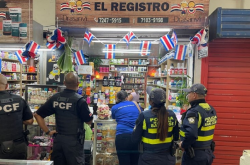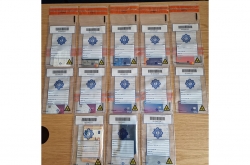In non-delivery fraud, criminals promise highly sought-after goods, collect payment, then never deliver. While the principle is simple, the fraud scheme is often sophisticated and can yield huge profits.
Criminals can adapt a well-established modus operandi to suit any product, from masks during a pandemic to electronics or even everyday items such as paper.
The bigger the sale, the bigger the profit. Products are sold by the container load, meaning that payments can easily run into the millions.
Read: Unmasked: International COVID-19 fraud exposed
In July 2020, following increased reports of large-scale non-delivery fraud, INTERPOL issued a Purple Notice to warn its 194 member countries of the modus operandi used by criminals. Although the Notice itself is for law enforcement use only, here are the five things you need to know about non-delivery fraud, and why it is so easy to fall prey.
1.It's organized crime.
Contrary to popular belief, these types of scams aren’t just carried out by lone “wheeler-dealers”. Organized crime groups have gone to great lengths to set up a sophisticated modus operandi involving websites, salespeople, intermediaries and of course, bank accounts. Scams often involve more than one country in order to make victims feel helpless and complicate investigations.
2. Advertising draws victims in
Glossy advertisements imitate those of trustworthy businesses, attracting victims with high-quality images, brand names and genuine reference numbers. Criminals approach potential buyers online or in person by infiltrating professional purchasing circles.
Fake websites and social media accounts almost identical to those of known businesses offer several ways to make contact with the alleged seller. Online contact forms, phone numbers and email addresses all give the impression of a legitimate customer service centre.
3. Everything seems official
Once contact is made, the sales exercise can begin. Prices for large orders are negotiated and validated by “superiors”. Scammers provide contracts, proforma invoices and paperwork on official letterhead.
Fraudsters then ask for an advance payment to secure the merchandise. The payments, which can go from 40% to 100% of the full order depending on the total amount, are made directly into accounts which have been opened under registered (fake) companies.
Finally, victims are given links or tracking numbers so that they can follow the shipment from the supplier to destination.
4. Salespeople create relationships
Alleged sellers work hard to create trust with the buyer. Whether it is flattery (“you’re my best client”), social engineering (“you’re so lucky, this product is impossible to find right now”) or lies (“we got special permission for this shipment”), the scammer will maintain contact throughout the delivery process.
The scammer will also invent as many reasons as possible to obtain extra payments along the way, such as customs fees, express delivery, insurance, etc. Contact is maintained until the victim starts to hesitate, becomes irate or accuses the salesperson of fraud.
5. They disappear
Once scammers feel they have been uncovered, they end all contact. Phones are cut off, emails go unanswered and websites are shut down. Victims are left in shock and ashamed, often reluctant to report the fraud to superiors and police.
Criminals, on the other hand, move on quickly and start a new fraud with a new product. If one domain is suspended or taken down, other domains are still available to attract new victims. The cycle starts again.
How to protect yourself from non-delivery fraud
Follow these steps to protect yourself from experienced fraudsters:
- Be aware of bogus websites – criminals will often use a web address which looks almost identical to the legitimate one, e.g. ‘abc.org’ instead of ‘abc.com’;
- Verify the company/individual offering the items before making any purchases;
- Check online reviews and consumer protection groups – for example, have other customers complained about not receiving the promised items?;
- Be wary if asked to make a payment to a bank account located in a different country, as it is more difficult to liaise with entities abroad once fraud is detected;
- Keep your radar on high alert, especially if you are asked to pay unplanned fees;








